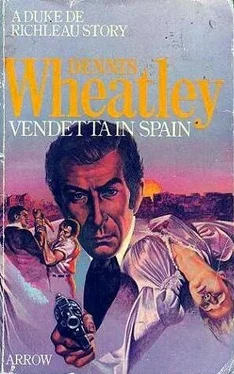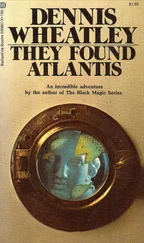As Urgoiti would have been certain to choose men of his own kidney to go out to Ferrer's recent hiding-place, de Richleau felt sure that the two detectives had perjured themselves; but there was nothing he could do about it.
The next witness to be called was a sandy-haired little man with pince-nez. He proved to be a ballistics expert. The Duke's automatic was produced and three bullets that had been extracted from Veragua's body, which he testified had been fired from the weapon.
The Duke held up his hand. The President nodded. 'You may speak.'
'Sir,' said de Richleau firmly, 'I do not deny that I shot this man, but when I first met him he was an anarchist using the name of Pineda. And my name is not Chirikov. You have only to confront me with General Quiroga and he will order this wicked charge to be withdrawn immediately. He is aware of my true identity and I swear to you that he will vouch for it.'
The Major looked a little uncertain and whispered to his two colleagues. Hope rose in de Richleau's breast, but Urgoiti had been murmuring to the Prosecutor. The latter rose to his feet and said:
'May it please the Court, evidence has already been given that the Prisoner is in fact Nicolai Chirikov. I submit that to request His Excellency the Captain-General to leave his urgent duties in order to attend this Court, only to tell it that he has known the Prisoner under another name, would be a most unjustified waste of His Excellency's time.'
The three officers who formed the Court again whispered together. Pale with anxiety the Duke watched them, waiting for their all-important decision. At length it came. The President said:
'The Court is satisfied that the Prisoner is the nihilist Chirikov. In the circumstances it would be pointless to request His Excellency the Captain-General to attend and give evidence. Let the case proceed.'
The Prosecutor was still on his feet. He bowed and again addressed the Court. 'The Prosecution has shown that Veragua was slain by bullets from the Prisoner's pistol. It remains only to show that he was on the premises where the murder was committed at the time it took place. Next witness.'
De Richleau glanced round to the door by which the witnesses entered. To his utter amazement he saw Ferrer walk in. That Urgoiti should have had the audacity to produce him seemed positively staggering. Yet there he was, looking more than his age despite his head of carrot-coloured hair, but his bright, intelligent eyes proclaimed that his mind was as active as ever.
When questioned by the Prosecutor, he told the same story as he had at Police Headquarters the previous night, with only a few embellishments. He lived alone out at San Cugat with only a daily woman who came in to do for him. He had been working in his study when he had heard a window smash at the back of the premises.. Fearing robbers who would do him violence he had hidden in a cupboard under the stairs, and so on.
As de Richleau listened he could hardly believe that he was not dreaming. That Ferrer of all people should be standing there swearing his life away seemed so fantastic that it could not possibly be true. Yet he was horribly aware that he was not suffering from a nightmare; this macabre travesty of justice was actually taking place.
The moment Ferrer stopped speaking the Duke burst into speech. Pointing an accusing finger at Ferrer he declared with passionate sincerity:
The witness has told a tissue of lies. He is not the peaceful citizen, Olozaga, that he claims to be. He is Francisco Ferrer, the notorious anarchist. It was he who ran the Escuela Moderna , the school for assassins. He has been responsible for more murders than any man in Barcelona. I demand . . .'
'Silence!' roared the President, banging on the table with his gavel. 'Silence!'
The Duke ignored him and cried above the din, 'I demand that General Quiroga be fetched so that I can prove my true identity. I demand that Ferrer, this man who has instigated outrages that have led to the death of hundreds of innocent people, be brought to trial. This Court dare not condemn me. I am here as a result of a conspiracy. Comandante Urgoiti is at the bottom of it. He has hatched this plot to have me shot so that Ferrer may go free.'
'Silence! Silence! Silence!' shouted the President; and then, 'If you do not stop this minute, I'll have you gagged.'
Breathless and sweating, de Richleau subsided. Ferrer was glancing nervously from side to side; but the Prosecutor nodded to him and he scurried swiftly back into the room from which he had come.
After a moment's hush the President said, 'Proceed,' and, standing up, the Prosecutor again addressed the Court.
T am confident,' he said, 'that the Court will disregard these wild accusations. It is obvious that they are no more than a bluff by which the Prisoner hopes to gain a few hours of life by beguiling the Court into an adjournment. But that he is guilty the Court can hardly doubt.' He then gave a very brief summing-up, ended by demanding the death penalty, and sat down.
The President made a sign to the Prisoner's Friend. Navarez stood up, bowed, fingered his little moustache, and said:
'May it please the Court, although I have been nominated as the Prisoner's Friend, I fear I can make only a poor showing in that role. When I interviewed the prisoner earlier this morning he would say little about himself except to make assertions impossible of belief, such as that he was a foreign Duke, a personal friend of His Majesty the King, had been staying in Barcelona as the guest of His Excellency the Captain-General, and so on. It is obvious that he suffers from delusions of grandeur. That would indicate that his mind is unbalanced, and the Court may wish to take his mental state into consideration. Apart from that I can only submit to you the statement he made to me, that he killed Veragua in self-defence; but, unfortunately, of that I can give the Court no proof.'
Had de Richleau not been so frantically anxious about the fate that might overtake him in the next quarter of an hour, he would have felt outraged by this travesty of a defence; but he had been prepared for something like it and his whole mind was concentrated on wondering if there was even a chance that the Court would agree on a verdict of 'Guilty, but with extenuating circumstances'. That would have meant imprisonment in the fortress and, given even a few hours, he might yet save his life.
In accordance with practice at courts-martial, the President put the question to the junior member of the Court first. 'Lieutenant Herrera, do you find the Prisoner guilty or not guilty?'
'Guilty,' replied the youth with the monocle.
The Duke's pulses raced. In his mind he saw again the courtyard outside and the lounging soldiers in it. On many occasions in Central America he had seen firing squads execute rebels, saboteurs and spies, and he knew that such executions could vary greatly. If the men ordered to do the job had never carried out an execution before, most of them hated it. They were either filled with pity for the condemned man, or reluctant to accept the guilt of having been a party to killing a fellow-human in cold blood; so they either fired over his head, or shut their eyes before pulling the trigger. That meant that the poor wretch up against the wall was rarely killed by the volley. Instead he dropped wounded and screaming, and the officer supervising the execution had to finish him off by putting his pistol to his jerking head and blowing out his brains. But if the men in the squad had had previous experience the majority of them aimed to kill. De Richleau thanked his gods that the men outside must have had ample practice at such work, so at least he could hope for a quick, clean death.
The President turned to the second senior member of the Court and said, 'Captain Escalante. Do you find the Prisoner guilty or not guilty?'
Читать дальше












